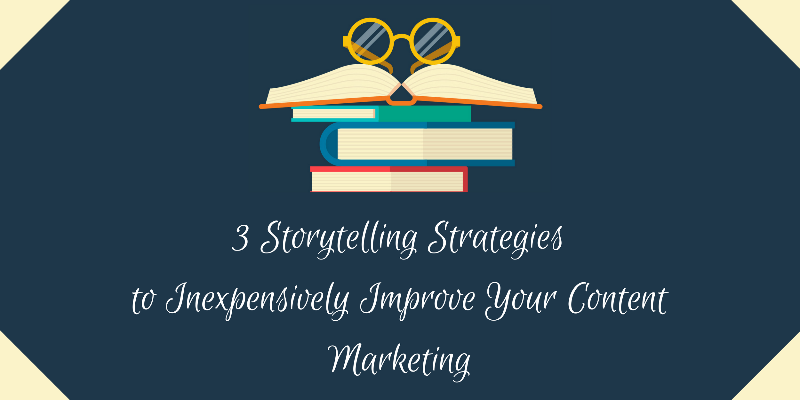The whole landscape of marketing is shifting; marketers who succeeded by wielding a large megaphone and blasting potential customers with promotional material (“COME BUY OUR PRODUCT!”) are finding their tactics less and less effective as consumers skip, mute, or otherwise tune out commercials.
In marketing’s new epoch, businesses create leads and valuable customer relationships by creating and sharing valuable, free content, a technique known (predictably) as “content marketing”. As a marketer or business owner, the trick is no longer about how many times you can stuff your business’s value proposition into a 30-second commercial. Instead, you must naturally catch and keep people’s attention long enough for them to care about who you are and what you’re selling.
Unfortunately, too many businesses equate “great content marketing” with “I can’t start until I have a massive budget of tens of thousands of dollars to hire graphic designers, videographers, and local marketing agencies”. This is a misconception: low-budget content marketing does not have to mean bad content marketing! Even the smallest of businesses have a chance to wow customers with a marketing strategy that has been around for time immemorial: a compelling story!
Your business is unique in every single way: so much about it, whether you install HVAC systems or teach dance lessons, is interesting! Storytelling is truly the original marketing campaign (little do we know that cave paintings are actually early classified ads trying to use a visual narrative to sell cave real estate), and it’s so often free!
Below I present 3 inexpensive storytelling tips that can help any content marketer. Give them a try!
Get Interviewed
Guess what: other people besides you are trying to use storytelling to drum up interest in their businesses! Newspapers, blogs, podcasts, magazines, Facebook pages, provide thousands of channels through which you can get your story out.
Of course, you may think, “it’s pretty unlikely that someone will reach out to little old me for an interview”. You’re likely correct, but that doesn’t mean that this channel of storytelling is unreachable to you! You’re a courageous business person, not a skittish flunky: the only good things to come to your business likely come as a result (whether direct or indirect) of your hustle. Think up some reasons that someone would like to hear your story, and go out and pitch yourself!
It’s impossibly closed-minded to believe that absolutely no aspect of your story could be compelling: maybe you’re a first generation business-owner without a college education, or maybe you’re the only one in your area who is offering the service that you offer. Maybe your kids are remarkably cute, or you’re a very young business owner compared to others in your market. Nothing about you is trite or boring, and anything can be spun as an interesting story; get out there and spin!
Tell Interesting Personal Stories, Even If They’re Not Directly Related to Your Business
One of my favorite treatises on storytelling was given by Renegade Advertising CEO Drew Neisser, who shined a light on humanity’s desire to hear good storytelling:
“We humans are hardwired to respond favorably to emotional stories, yet 98% of branded content lacks any of the elements of good storytelling (narrative, conflict, character development, etc.).”
Be part of the 2%!
A good friend created a software testing outsourcing business that was going nowhere: he’s a gifted programmer and team leader, but was completely lost when it came to marketing.
“I really just have no idea what to do with content marketing: I feel like I’m not creative or charismatic enough to actually come up with fun, interesting ideas”.
We eventually decided to create a short eBook that talked about the advantages of outsourcing software testing. This eBook was the very paragon of content marketing excellence, offering interesting insights from an industry expert in a frictionless, easily consumable medium. We targeted the right Google keywords and did everything right… but still absolutely no traction!
Finally, I began to realize that our issue may be one of personality. I reflected on my friend’s journey to his place as a small business owner: born and raised in Mexico, he came to America in 1998 with nothing but a suitcase of clothes, a few personal connections, and a vision of how software would change not just America, but all his friends and family back home in Mexico. He hustled his way to a bottom-of-the-barrel software testing job with Microsoft, but climbed his way up the ladder there over 14 years until he became one of the company’s chief Project Managers, with responsibility for all software and QA (quality assurance) testing.
Rather than just focusing on the cold, straightforward, logical sales approach, we began spinning a compelling personal narrative: we regaled sales leads with this story and included it in the eBook and on his website, along with a picture of him and his obviously happy family. We immediately began to gain more ground: existing customers, leads, and strangers alike all agreed that his story was unique and compelling, and was enough of an attention grab to push them to listen more closely to his sales pitch.
Your stories don’t have to be as unusual and gripping as my friend’s: not everyone comes penniless from Mexico with a dream of being a software mogul. However, hopefully his story shows that your business’s narrative doesn’t have to be directly about the business itself! Your story can be about your sojourn to become your own business owner, or how you learned business skills, or it can be a totally unrelated story from your youth that can be used as a metaphor for some business principle. Tell these stories often, on your marketing materials, website, in sales calls and in meetings with your own employees.
Want Help With Your Content Marketing?
 The 3 Pillars Guide Will Get You Focused on The Right Things - At The Right Time. Enter your email address to get it now
The 3 Pillars Guide Will Get You Focused on The Right Things - At The Right Time. Enter your email address to get it now
Your stories won’t just have a positive effect on your marketing efforts, they may change the very fabric of your organization. According to John Coleman in this Harvard Business Review article, one of the key drivers of your organization’s culture is the stories that you tell and the narratives that drive people’s perceptions of what your business is. Think about places that you’ve worked before and the values that your employers espoused, and then think about some of the stories that were told.
I once worked at a company that valued effort and hard work above all else: the story was often told how Kathy, one of the company’s software developers, stayed up for 68 hours straight to ensure that a new software was debugged in time for implementation with a big customer. Organizations telling stories isn’t just a small business thing: massive companies like Google have their own stories that match up with company values. Google emphasizes ingenuity, and spares no opportunity to talk about the story of founders Larry Page and Sergey Brin dropping out of their Stanford Ph.D. program to further their ingenious idea for the Google search engine.
These stories don’t just have to be about yourself: talk about those who inspired you, those who came before you, your friends, your family, your community, or the intersection between any of these elements. The human experience is the ultimate source of great narrative and content, you must tap into it!
Use Case Studies to Make a Case For Yourself
Too many business graveyards are filled with the bones of businesses who tried desperately to make a case for themselves with weak, floundering copy (e.g. “We’re the best in the business”, or “A name you can trust!”). People need a reason to believe that your product/service works, beyond just your word. Why else would Zappos offer free returns, or car dealerships offer free test drives?
Jake Butler, the Chief Marketing Officer of Grow (maker of the Grow marketing dashboard), makes a compelling case for the importance of case studies. In Grow’s business, current customer-to-future-customer communication is everything.
“Customer stories are one of our marketing team’s most incisive, effective tools. Prospects are making a scary purchasing decision; there is nothing more comforting for them than hearing that previous customers who had their same challenge found a solution. To say to a prospect, ‘Here’s someone like you who had the same struggles you do, and here’s how Grow was able to help them’ adds a unique dimension of trust to the sales process. It’s powerful.”
Case studies give a dimension of trust that your word alone cannot: why tell someone when you can easily prove it to them? These studies aren’t always very simple to create: you’ll have to get permission from clients, take pictures, get quotes, and lay out a nice looking document that you can give to prospective clients. However, the human connection that a case study offers is worth every penny and second that you spend making it: make sure to cultivate these case studies and be ready to deliver stories about how your business worked!
Conclusion
Don’t be the business that loses thousands by just throwing together promotional materials: add the human element to your marketing and watch your business make far more personal connections!
Author bio:
Lewis Robinson is a former CEO with experience starting and running several small software companies. He currently lives in Pocatello, ID, where he consults with small/medium businesses and start-ups all around the Mountain West. You can reach him through his LinkedIn profile or at [email protected]





